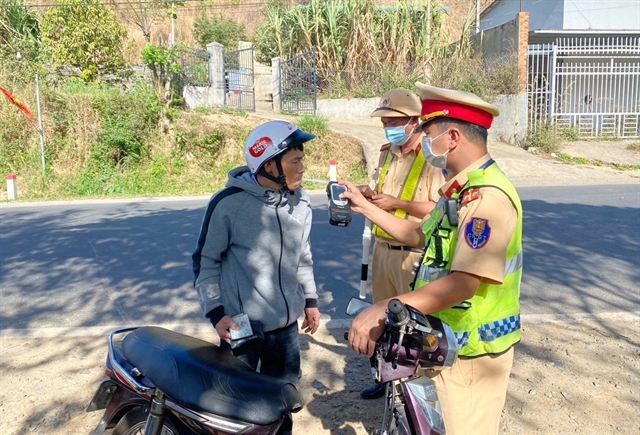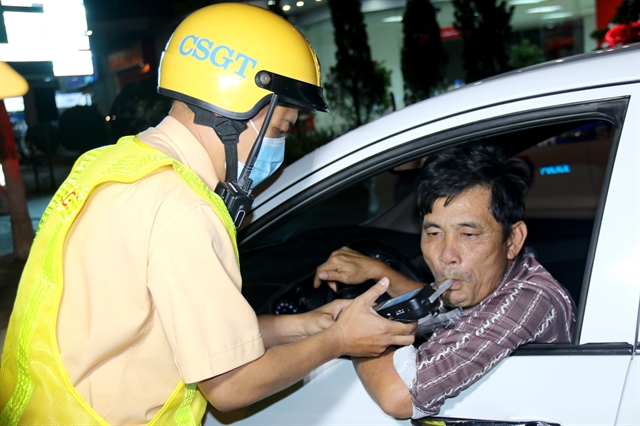 Society
Society

 |
| A traffic police officer checks the alcohol level of a driver in Phan Thiết City in the southern province of Bình Thuận. VNA/VNS Photo |
HÀ NỘI — The Ministry of Public Security has submitted an explanatory report on the draft Law on Road Traffic Order and Safety to the Government, in which the ministry proposes to maintain the zero-tolerance alcohol policy.
This means drivers must be completely sober, not having drunk any amount of alcoholic drinks, while operating vehicles.
Compared to the previous draft, the amended report includes additional data to demonstrate the necessity of the absolute ban on alcohol levels. Specifically, the ministry’s drafting agency affirmed that after considering the opinions of delegates at the NA’s sixth plenary session, it had collaborated with the Ministry of Health to conduct research, refer to international experience, organise sociological investigations, and scientific workshops on the effects of alcohol on road traffic users and sought opinions from medical experts at major hospitals in Việt Nam.
The results showed that alcohol directly affected the mental health and behaviour of individuals, especially those who consumed alcohol when participating in traffic.
“Scientists unanimously agree that drivers consuming alcohol must be strictly fined due to alarming statistics about the harm caused by drunk driving," the draft report stated.
Figures from the ministry showed that between June 2022 and December 2023, the number of deaths and injuries due to alcohol-related road traffic accidents accounted for 20 per cent of the total number of deaths and injuries caused by road traffic accidents, of which 80 per cent were due to drunk driving.
According to statistics from the ministry’s sociological investigations of 43,765 prisoners serving sentences in the ministry’s detention camps, more than 22,440 prisoners had used alcohol before committing crimes, accounting for 51.28 per cent of the total.
This figure applied to seven categories of offences such as murder, intentional injury, public order disruption, rape, resisting officers and traffic violations.
The ministry also reaffirmed that handling drunk driving among drivers has been very effective.
After traffic police intensified crackdown on drivers violating alcohol limits in 2023, the number of traffic accidents related to alcohol consumption decreased by 25 per cent, the number of deaths decreased by 50 per cent, and the number of injuries decreased by 22 per cent compared to the same period in 2022.
Furthermore, the drafting agency also asserts that the zero-tolerance alcohol policy will gradually instil the habit of not consuming alcohol for road traffic users. Once awareness and good traffic culture are established, the ministry will consider the amendment to be more appropriate.
Given the various opinions regarding alcohol concentration regulations, the Government Office has recently collected Government members’ opinions on this issue and reported to the NA Standing Committee for consideration and submission to the upcoming seventh session of the NA in May.
Previously, the Ministry of Justice, the Ministry of Home Affairs, and the Vietnam Automobile Transport Association gave feedback on the draft report, suggesting that the drafting agency collaborate with the Ministry of Health to assess the scientific basis to determine breath alcohol concentration and endogenous alcohol concentration as certain beverages and fruits also produce alcohol.
They said it would be necessary to further evaluate practical aspects as Việt Nam has many customs, traditions, and festivals.
There were proposals to supplement the economic impact assessments of the zero-tolerance alcohol policy, such as impacts on the alcoholic beverage production industry, the food and beverage service sector, and the competitiveness of businesses.
In addition, they also reminded the drafting agency to review Việt Nam's culinary culture and the drinking habits of Vietnamese people. The ministry’s assessment that ‘a person once started drinking would never stop’ may be subjective and inaccurate.
The Ministry of Public Security was urged to include studies on the effects of alcohol on the perception and behaviour control of drivers at different levels of intoxication and cases of endogenous alcohol concentration.
Regarding these issues, the ministry said it had instructed the Traffic Police Department to collaborate with the Medical Examination and Treatment Department of the Ministry of Health to conduct sociological investigations and scientific workshops on the effects of alcohol consumption on the human nervous system. — VNS




